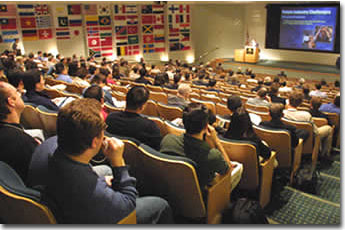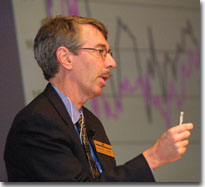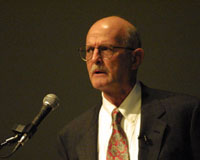|
 |
UCLA Anderson Forecasters See U.S. Economy Staggering Forward with
Possibility of Another Tumble;
California Prepares for Recovery After 2001
Downturn
|
March 26, 2002
UCLA Anderson Forecast
|

|
LOS ANGELES — With no obvious driver to power an economic recovery, economists with the UCLA
Anderson Forecast predict that the national economy is looking at a “very sluggish period ahead,”
with considerable risk of another recessionary dip.
In his report titled “This is Our First Business Cycle,” Edward E. Leamer, director of the UCLA
Anderson Forecast, and economics professor at The Anderson School at UCLA, notes that past recoveries
have been fueled by consumer spending on goods and real estate - essentially “consumer cycles” driving
the economy. But since these key sectors have remained steady throughout the recent recession and mild
turnaround, the current climate will grow hotter only if powered by an increase in business investment.
 But Leamer has his doubts about increased business investments in the near future. “Business investment
in pursuit of technological innovations has long waves that last a decade or more — a peak in 1980 and
another in 2000. It is highly unlikely that there will be a sharp recovery of business investment in the
next year or two,” he notes. But Leamer has his doubts about increased business investments in the near future. “Business investment
in pursuit of technological innovations has long waves that last a decade or more — a peak in 1980 and
another in 2000. It is highly unlikely that there will be a sharp recovery of business investment in the
next year or two,” he notes.
The report also takes an up-close look at the Internet Rush and its lasting effects on the current economy.
Leamer notes that the Rush increased productivity (output per hour), but not corporate profits, and
sustainable economic growth requires both. “The two Ps (productivity and profitability) went their separate
ways in 1998. The mad dash to have the coolest Web site was supported by a surge in investment in equipment
and software, but profits completely stalled and the ratio of profits to investment took a nosedive,” Leamer
writes.
Leamer speculates that the Internet is actually killing profits while new communications technology is
exacerbating the problem — two areas believed by many to be inherently positive factors for the economy.
“The Internet has fundamentally changed retail competition, affecting especially the capacity — dependent
sectors including hotels, airlines, autos, PCs, wireless and so on,” Leamer said. “The ability of customers
to shop without cost greatly increases the intensity of competition.”
He notes that the Internet Rush created three imbalances in the economy. Businesses invested as if profit
were not the goal, consumers spent as if scarcity were a problem of the past, and portfolio managers put
most of their eggs in the U.S. basket. How well and how fast these imbalances are corrected will determine
the course of the economy in the next several years.
“Correction of the business investment imbalance created the recession of 2001, but correction of the other
two imbalances is still ahead of us,” Leamer said. “A rapid shift from a spending mode to a savings mode by
consumers or a rapid shift out of U.S. dollar assets by global portfolio managers would cause another recession.”
|
California quarterly outlook
|
In the quarterly California report titled “California: How Strong an Expansion?” Senior
Economist Tom Lieser reports that economic decline in California has been deeper than in
the rest of the nation — whether or not one is willing to call the dip a “recession.”
“By our rationale, using personal income as a barometer, there is little doubt that, recession
or not, California fell further than the national economy during the last three quarters of 2001,”
Lieser writes.
According to data detailed in the report, California personal income declined
during the second, third and fourth quarters of last year, even before adjustment for inflation.
As one would expect, wages took a particularly hard hit in the San Francisco Bay area where the
technology bust hit hardest.
 However, one positive outlook this quarter is that the big job
losses are likely behind us, according to Lieser. However, one positive outlook this quarter is that the big job
losses are likely behind us, according to Lieser.
Lieser asserts that the critical question now
facing California is the strength of the impending recovery. Lieser forecasts that when the data
is in for the early parts of 2002, we will see moderately positive employment growth. The rest of
the year has signs of strength as well.
“By the second half of this year, areas of current strength
should be augmented by a turn in the technology sector. A pickup in computer services and personnel
services will bring about a resumption of growth in business services. High tech employment in
electronics will add jobs at a modest pace.” By 2003, sectors including aerospace and motion pictures
will rebound and contribute to a growing California economy.
The UCLA Anderson Forecast is one of the
most widely watched and often-cited economic outlooks for California and the nation, and was unique in
predicting both the seriousness of the early-1990s downturn in California, and the strength of the
state's rebound since 1993. Most recently, the Forecast is credited as the first major U.S. group to
declare the recession that began in the second quarter of 2001.
|
|
|

